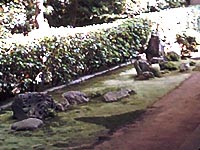| Ikkyu | |
| Japanese Poet, Priest - (1394-1481) | |
|
Ikkyu is a tremendously important figure in the evolution of world thinking. He understood the beauty of both high and low culture, and he gently celebrated the ironies of life in a series of poems and drawings as he practiced Zen Buddhism in 14th centry Japan. This is my current favorite Ikkyu poem:
Natural, reckless, correct skill;(number 291 in Sonja Arntzen) At a cash register as a teenager I picked up a copy of Wild Ways: Zen Poems of Ikkyu a small, slender pocket-sized paperback translated by John Stevens, published by Shambala books (1995 - sadly no longer in print). I was probably incented to buy it because of the sex poems. There's something nicely saucy about sex poems that last five or six hundred years. Ikkyu wrote graphically, straightfowardly, about a woman's vagina as a beautiful, alluring, important place, "the birthplace of all the ten thousand buddhas" and his own penis and the joys that could be found playing in his loincloth.
A Woman's Sex:
A Man's Root: (A fundoshi is a type of loose-fitting underwear once worn by Japanese men.) Then as I grew older I read some of the other poems included there. A monk decries incense in the temple - the trapping of spiritual searching without the hard practice. A monk celebrating all pleasures, drinking, whoring, and finding wisdom in the work of a fishmonger. Admirably worldly and wise, humble and well-travelled. An admirable entertaining fellow this Ikkyu seemed to be. Ikkyu is a fabled character in Japan. There are stories of him outwitting some kings and priests as a child. These tales were made into an animated TV show. So often, when I tell Japanese folks I like Ikkyu, they think I like him because of some cute cartoons. Having never seen enough of the cartoons to say for sure, I reply that instead I like his poems. When I first arrived in Japan I went to a book store and bought a thick, expensive tome of Ikkyu's works. It turned out to be nothing but a brick yet, something so serious and dense seeming that Japanese people need a dictionary to pick through it. Ikkyu wrote in classical Chinese, and his poems are thick with references to mountains, heroes, gods, royalty, meals, implements - all the trappings of life in traditional storied China. In April 2002 realized this entire frame of reference informed the poems I read of his after I found a marvellous book in the Foreign Correspondents' Club Library, last checked out in 1987: Ikkyuu and the Crazy Cloud Anthology: A Zen Poet of Medieval Japan Translation, Translation and Introduction by Sonja Arntzen.
There's not much about Ikkyu online, a few translations, some sex poems, some fables. I bought a copy of the Sonja Arntzen book; it was quite expensive! One zen priestess writes glowingly about him:
One of the characters I want to introduce you to is a wonderful character in the Zen tradition, called Ikkyu, who is one of my longstanding and favourite Zen masters and who appeals, I guess, to the wild woman in me. He was born in 1394 and was an illegitimate son of the emperor Go-komatsu. He was known by some as the emperor of renegades, a wild wandering monk and teacher, sometimes called Crazy Cloud. He was a lover, a poet, and he could write very tenderly about the beauty of women. He relentlessly attacked the hypocrisy of the then corrupt Zen establishment, and even had women as his students. I think he was one of the first Zen masters to have women as students; that was considered quite radical. It was in the brothels and geisha houses that he developed the Red Thread Zen, a notion he borrowed from the old Chinese master Kido and extended to deep and subtle levels of realisation. From Red Thread Zen: The Tao of Love, Passion, and Sex by Subhana Barzaghi.
Links (June 2002)
| |
justin's links by justin hall: contact
